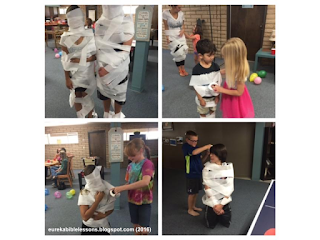Hi Friends!
Today I am sharing a lesson that focuses on Jacob wheeling and dealing with Esau to get the birthright. This can be read about in Genesis 25.
The idea for the introduction comes from HERE.
Introduction:
Activity #1 → Valuables Trading Cards. These can be printed out on slips of paper and distributed among your group.
- Students are given 3 minutes to trade cards
- Have students rank what they have in order of importance → discuss
Activity #2 → My Most Valuable Things
I also had on display a few items that are worth something to me - either monetarily or for memory's sake: I had a blanket that one of my grandmas had made when I was a young girl, the full collection of F.R.I.E.N.D.S., my wedding album, and a sample of my Hard Rock bear collection.
- Which of these items is most likely worth the most money?
- Which of these items would you think is the least valuable to me? Why? Which is the most valuable to me? Why?
- How do you think I would feel if our car was broken into at lunch today and everything was taken?
The WHAT:
Read Genesis 25:19-34 and ask
- What are your observations?
- What does this make you think?
- Help students to connect with the fact that Esau didn’t value/respect his birthright, and that’s why he was so eager to trade it away to his brother Jacob.
The SO WHAT:
Provide students with list of virtues and definitions
- In partners, have them come up with examples of how these are NOT valued by the world
- Discuss responses
- Help students to connect that as God’s children we are to value what He values, not what the world says about it.
The NOW WHAT:
- What are some ways that you can be ready to make difficult choices?
Close:
- Share with students the Key Verse: 1 Peter 3:14 - But even if you should suffer for what is right, you are blessed. “Do not fear what they fear; do not be frightened.”
- Remind students that sometimes they will have to make hard choices, but they can be encouraged knowing that ultimately they are making the choice to please their heavenly Father.
- Pray with your students





















